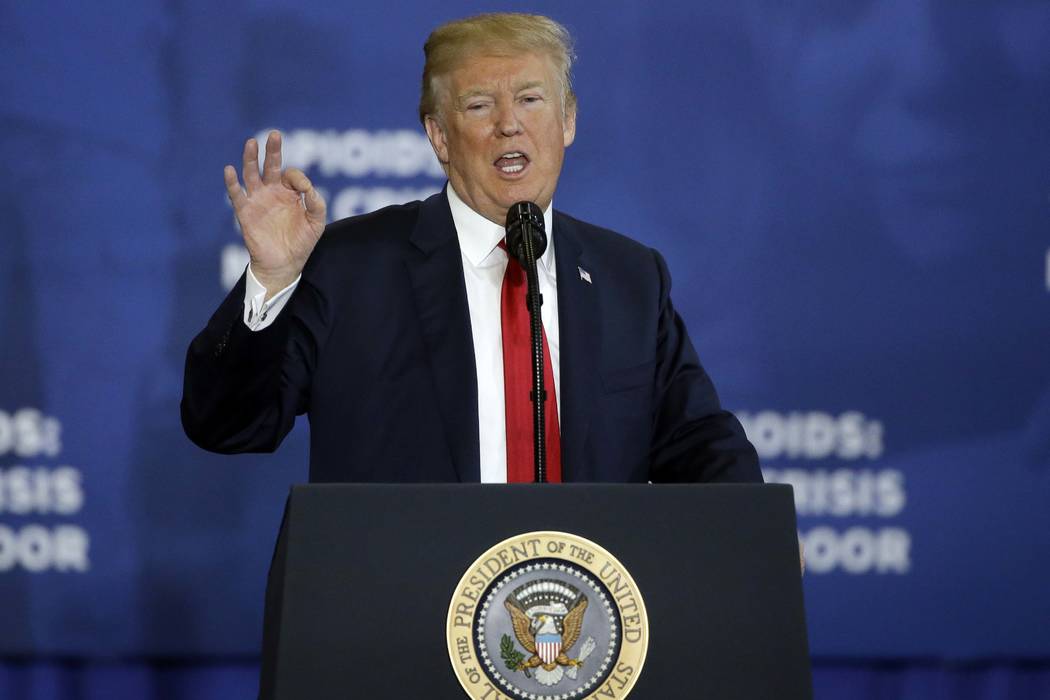Trump vows to ‘get tough on drug dealers’ to beat opioid crisis
WASHINGTON — President Donald Trump traveled Monday to New Hampshire, home of the nation’s first presidential primary and the state he once described as a “drug-infested den,” to present his plan to beat America’s opioid crisis.
The president prefaced his remarks at Manchester Community College with the recollection that the campus is “the first place I came” in June 2015 after he threw his hat into the GOP race for president. “This is the room right here,” Trump said. “So I like this room.”
During a telephone briefing Sunday, a senior White House official told reporters the talk was not related to the 2020 re-election campaign. This was Trump’s first visit to New Hampshire since he took the oath of office.
Trump’s plan targets the over-prescription of opioid drugs, with the goal of reducing prescriptions by a third over three years.
The White House plan also looks at ways to save or improve addicts’ lives by ensuring first-responders’ supply of naloxone, which can be used to reverse overdoses, and drug testing of federal inmates who could be placed in residential re-entry centers. The administration also supports research to develop non-addictive pain management.
The focus on services reflected remarks Trump made during a moving personal speech in October, when he declared the opioid crisis a national public health emergency.
The president spoke of how alcoholism destroyed and ended the life of his older brother Fred. “Illegal drug use is not a victimless crime,” he said. “There is nothing admirable, positive or socially desirable about it.”
Death penalty for some traffickers
Still, Trump’s heart seemed to beat strongest for the third prong of his plan — tougher law enforcement, including the death penalty for some drug traffickers.
“We can have all the blue-ribbon committees we want, but if we don’t get tough on the drug dealers, we’re wasting our time,” Trump told the crowd.
The answer, he said, is tough law enforcement, “and that toughness includes the death penalty.”
To the casual listener, Trump’s remarks might seem to advocate capital punishment for drug dealing itself, which would require a change in federal law.
Over the last few weeks, Trump has seemed to suggest just that as he extolled China and Singapore for executing drug traffickers. Trump told a group in Pennsylvania that he asked Chinese President Xi Jinping if China has a drug problem. Xi answered that his country does not have a much of a problem because of the death penalty.
According to PolitiFact, China and Singapore “do have the death penalty for individuals who traffic, smuggle or transport certain drugs.”
But the White House clarified that Trump wants his Department of Justice to “seek the death penalty against drug traffickers, where appropriate under current law.”
Federal “drug kingpin” laws do allow for the death penalty for certain drug crimes but not for trafficking alone. According to John Malcolm of the conservative Heritage Foundation, “a death has to result. If I give you fentanyl, if you die and it’s because of drugs I sold to you, that is death penalty eligible.”
Tougher sentencing sought
“The public is mad,” Malcolm added as he saluted Trump for “giving voice to a society’s views about what constitutes just deserts.”
The president also called on Congress to increase federal mandatory minimum sentences for offenders convicted of trafficking opioids that are lethal in trace amounts.
In a conference call with reporters, Marc Mauer, executive director of the criminal justice reform group The Sentencing Project, cautioned that tougher sentences are less likely to serve as a deterrent than certainty of punishment.
Trump claimed that drug dealers kill thousands during their lifetime, destroy more lives, and when they’re arrested, “they’ll get 30 days in jail. Or they’ll go away for a year, or they’ll be fined.”
But according to the Bureau of Justice Statistics, fewer than 1 percent of federal drug offenders are sentenced to less than a year in jail; 34 percent serve 10 years to 20 years, and another 13 percent serve 20 years or more.
Trump also pulled out issues that played well with Republican voters during the 2016 Granite State primary, which he won handily. Hillary Clinton won the state in the general election by less than half a percentage point.
Trump complained that Democrats are fighting his efforts to “build the wall to keep the damn drugs out.”
Trump also railed against sanctuary cities — he named nearby Boston and Lawrence, Massachusetts — as refuges for criminal elements. If governments don’t stand up for legal residents, he warned, “you’re not going to have a country left.”
Contact Debra J. Saunders at dsaunders@reviewjournal.com or 202-662-7391. Follow @DebraJSaunders on Twitter.

















